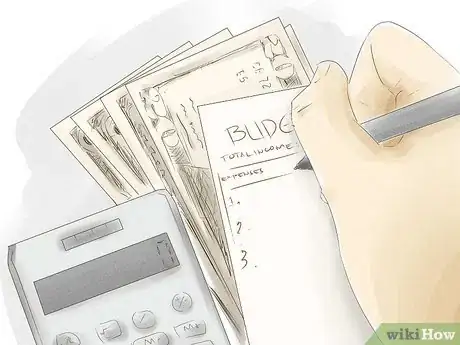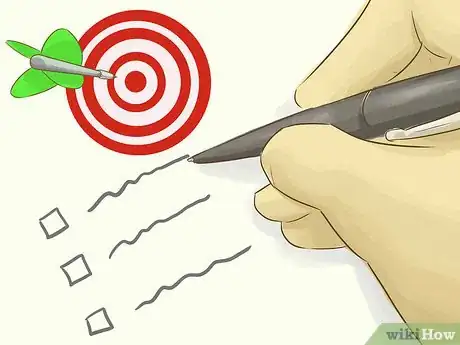This article was co-authored by Noel Hunter, Psy.D. Dr. Noel Hunter is a Clinical Psychologist based in New York City. She is the director and founder of MindClear Integrative Psychotherapy. She specializes in using a trauma-informed, humanistic approach for treating and advocating for people diagnosed with mental disorders. Dr. Hunter holds a BA in Psychology from the University of South Florida, an MA in Psychology from New York University, and a doctorate in Psychology (Psy.D) from Long Island University. She has been featured in National Geographic, BBC News, CNN, TalkSpace, and Parents magazine. She is also the author of the book Trauma and Madness in Mental Health Services.
There are 11 references cited in this article, which can be found at the bottom of the page.
wikiHow marks an article as reader-approved once it receives enough positive feedback. In this case, 100% of readers who voted found the article helpful, earning it our reader-approved status.
This article has been viewed 114,160 times.
Fantasies can be an escape to happier times and places, but if you find yourself dreaming more than you are living, it may be time to stop. Since fantasizing can be an escape mechanism, you should learn and deal with the source of your daydreams. Work on redirecting your thoughts and increasing concentration so that you can become more focused and alert. Your fantasies can be productive, however, as long as you channel them to become more productive and proactive in your daily life.
Steps
Identifying the Root of Your Fantasies
-
1Learn your triggers. Sometimes, you may find yourself fantasizing while certain music is playing or while you’re doing an activity, like driving. Whenever you notice your mind wandering, take note of when it happens and what you’re doing. Your trigger might be:[1]
- A place, such as your office, shower, or a car.
- A type of music or sound.
- An activity, like sitting at a meeting or walking your dog.
- A person, such as a difficult partner or family member.
-
2Keep a journal of your fantasies. Writing down your fantasies and daydreams can help you determine why you have them. Furthermore, the act of writing will help redirect you from the fantasy by letting you channel your imagination into a creative activity. Go into as much detail as you can.[2]
- Try to determine if these fantasies are revealing any dissatisfaction or unmet needs in your life. For example, if they are largely sexual in nature, you may be yearning for more intimacy.
- Look for patterns between each entry in your fantasy journal. If all of your entries are about getting a better job or becoming famous in your field, your fantasies may have to do with your ambitions in life.
Advertisement -
3Manage your time if you use fantasy to procrastinate. Fantasizing can be an effective way to put off work. If you use your fantasies to avoid work or to delay doing something, time management skills can help.
- Set a schedule for yourself everyday to keep yourself on track.
- Do your important tasks at the beginning of the day to make sure that they get done.
- Avoid multitasking, or you may find yourself unable to focus on any task.
-
4Take up a new hobby if you're bored. If your fantasy lets you escape from the boredom of everyday life, you may need a new hobby or creative outlet. Journaling, creative writing, or painting can give you a creative outlet for your dreams. Active hobbies, such as sports or rock climbing, can also provide some excitement to your life.
-
5Fix relationship problems to stop romantic fantasizing. If your fantasies are often about sex or romance, you may be unhappy with your current romantic status. Whether you are single or in a relationship, try to find areas where you are unfulfilled so that you can get better.
- If you are in a relationship and keep thinking about other partners, consider if you want to stay with your partner. If you do, couples counseling can help.
- If you're obsessing over unavailable partners, such as celebrities or married people, look for relationships that are available to you through online dating or speed dating.
Improving Your Focus and Concentration
-
1Change up your routine. You may be most likely to fantasize when doing mindless tasks, like washing the dishes. Rather than sticking to the same routine or doing tasks in the same order each day, mix it up. This will add spice to your day, and help your brain gain more focus and attention.
- For example, if you usually wake up, workout, make brunch, then clean the house on Sunday, try something new. Go out to eat, exercise at night, or clean first thing in the morning.
-
2Redirect your attention when your mind wanders. When you find yourself slipping into a fantasy, stop yourself. Distract yourself from the fantasy by starting a different task or focusing on a different object.[3]
- To disrupt the fantasy, you can get up and stretch or do a simple exercise, like jumping jacks.
- Start focusing on an object around you, such as a paperweight or a cup. Notice its little details. Touch it to see what it feels like. This can help you become more mindful.
- You might even keep something in your pocket that you can touch that will help remind you to stay present.[4]
-
3Practice mindfulness meditation. Mindfulness brings you to the present moment by helping you focus on sensations. Sit in a comfortable chair, and take deep breaths. Concentrate only on the sensation of your breath. If your mind starts to wander, stop yourself, and start focusing on your breath again.[5]
- Start with a short period of time, such as ten minutes, and work your way up to longer periods.
- You can also expand your awareness to other sensory details. What are you touching? Do you smell anything? What sounds do you hear?
-
4Take breaks between activities. Your brain can only focus on a task for a certain amount of time before it starts to wander off. Take a five to ten minute break between tasks or after an hour of work. This will help you stay on task when you start again.[6]
- Good things to do during your break include drinking a cup of tea, taking a short walk, or stretching.
-
5Avoid multitasking. In a fast-paced society, multitasking has become the norm as people try to accomplish and complete too many tasks in a short time frame. Brains are very fluid, and when you train your brain to function in such a way, you’ll lose your ability to focus. Lack of focus leads to distractions through daydreaming or thinking about other things. Eliminate the habit of multitasking from your life and start focusing on one task at a time.
- Turn off all of your distractions and commit your attention to one task at a time.
- The moment you feel your thoughts start to wander, stop what you're doing, take a five minute break, and come back to the same task.
-
6Get enough sleep. If you’re sleepy, you’re more likely to start daydreaming. Aim to sleep between seven and nine hours a night. Having a consistent sleep schedule where you sleep and wake up at the same time can also help.[7]
- Try to clear your mind at night so you don’t lie awake in bed fantasizing. Meditate before bed, and avoid any bright screens for an hour before bedtime.
- In the morning, instead of lying in bed daydreaming, try to get up right away and start your day.
Turning Your Dreams into Reality
-
1Use your fantasies to identify what you want in life. Fantasies are not necessarily an unproductive activity. In fact, your daydreams can tell you what you want in life. While you may not become a professional golfer or marry a millionaire, you can discover realistic goals.[8]
- For example, if you frequently daydream about winning the lottery, you may be worried about money. You may want to start more effective financial practices.
- Try to understand what's causing you to fantasize. For instance, if you're turning to daydreams because you're unhappy in your current situation, you might need to take steps to try to change things in your life.[9]
-
2Set goals. The best way to achieve your dreams is to set realistic and achievable goals for your life. Break each goal up into a number of manageable steps, and give yourself a date to achieve each step by. Soon, you may find your fantasizing turning into action.[10]
- If you want to save more money, you might give yourself a saving goal. Set a manageable amount of money to save by a certain date. You can also make goals to get a better job or to budget more effectively.
-
3Tell other people your goals. It can be easy to slip back into fantasizing. To keep yourself accountable, tell your friends and family about your goals. Once other people know, you may work harder to not let them down.[11]
- Ask a friend or family member to be an accountability partner. This is someone who checks in on you periodically to see how far you have progressed.
-
4Visit a doctor or therapist for help. If you find yourself unable to avoid fantasizing, you may want to visit a doctor or therapist for more help. These trained professionals can help you identify any medical conditions that could increase your fantasizing or help you understand the underlying causes of your fantasies.[12]
- If you find yourself unable to stop fantasizing or if you feel that excessive daydreaming is taking over your life, you may suffer from maladaptive daydreaming.
- If your fantasy helps you cope with abuse or trauma, professional therapy can teach you healthier coping mechanisms.[13]
Expert Q&A
Did you know you can get expert answers for this article?
Unlock expert answers by supporting wikiHow
-
QuestionHow do I stop daydreaming?
 Noel Hunter, Psy.DDr. Noel Hunter is a Clinical Psychologist based in New York City. She is the director and founder of MindClear Integrative Psychotherapy. She specializes in using a trauma-informed, humanistic approach for treating and advocating for people diagnosed with mental disorders. Dr. Hunter holds a BA in Psychology from the University of South Florida, an MA in Psychology from New York University, and a doctorate in Psychology (Psy.D) from Long Island University. She has been featured in National Geographic, BBC News, CNN, TalkSpace, and Parents magazine. She is also the author of the book Trauma and Madness in Mental Health Services.
Noel Hunter, Psy.DDr. Noel Hunter is a Clinical Psychologist based in New York City. She is the director and founder of MindClear Integrative Psychotherapy. She specializes in using a trauma-informed, humanistic approach for treating and advocating for people diagnosed with mental disorders. Dr. Hunter holds a BA in Psychology from the University of South Florida, an MA in Psychology from New York University, and a doctorate in Psychology (Psy.D) from Long Island University. She has been featured in National Geographic, BBC News, CNN, TalkSpace, and Parents magazine. She is also the author of the book Trauma and Madness in Mental Health Services.
Clinical Psychologist That's very individualized, and what's helpful for one person is different for another. However, understanding why you daydream so much can be very helpful. For instance, if you're daydreaming a lot because you're trying to find ways to escape a terrible situation, then the daydreaming isn't really the problem in the situation.
That's very individualized, and what's helpful for one person is different for another. However, understanding why you daydream so much can be very helpful. For instance, if you're daydreaming a lot because you're trying to find ways to escape a terrible situation, then the daydreaming isn't really the problem in the situation. -
QuestionHow do I learn to be present instead of daydreaming?
 Noel Hunter, Psy.DDr. Noel Hunter is a Clinical Psychologist based in New York City. She is the director and founder of MindClear Integrative Psychotherapy. She specializes in using a trauma-informed, humanistic approach for treating and advocating for people diagnosed with mental disorders. Dr. Hunter holds a BA in Psychology from the University of South Florida, an MA in Psychology from New York University, and a doctorate in Psychology (Psy.D) from Long Island University. She has been featured in National Geographic, BBC News, CNN, TalkSpace, and Parents magazine. She is also the author of the book Trauma and Madness in Mental Health Services.
Noel Hunter, Psy.DDr. Noel Hunter is a Clinical Psychologist based in New York City. She is the director and founder of MindClear Integrative Psychotherapy. She specializes in using a trauma-informed, humanistic approach for treating and advocating for people diagnosed with mental disorders. Dr. Hunter holds a BA in Psychology from the University of South Florida, an MA in Psychology from New York University, and a doctorate in Psychology (Psy.D) from Long Island University. She has been featured in National Geographic, BBC News, CNN, TalkSpace, and Parents magazine. She is also the author of the book Trauma and Madness in Mental Health Services.
Clinical Psychologist Practicing mindfulness skills is probably the most helpful thing. Once you start to daydream, try to bring yourself back to the present, and keep doing that each time your mind wanders. It can also help to carry around some kind of stress relief toy, like a spiky ring or something you keep in your pocket that you can touch to ground yourself and bring yourself back.
Practicing mindfulness skills is probably the most helpful thing. Once you start to daydream, try to bring yourself back to the present, and keep doing that each time your mind wanders. It can also help to carry around some kind of stress relief toy, like a spiky ring or something you keep in your pocket that you can touch to ground yourself and bring yourself back.
References
- ↑ https://healdove.com/mental-health/maladaptive-daydreaming-what-is-it
- ↑ https://www.theatlantic.com/health/archive/2015/04/when-daydreaming-replaces-real-life/391319/
- ↑ https://www.mindful.org/3-simple-steps-stop-mental-time-traveling/
- ↑ Noel Hunter, Psy.D. Clinical Psychologist. Expert Interview. 18 December 2020.
- ↑ https://www.helpguide.org/harvard/benefits-of-mindfulness.htm
- ↑ https://www.mindtools.com/pages/article/newHTE_78.htm
- ↑ https://www.ncbi.nlm.nih.gov/pmc/articles/PMC3946719/
- ↑ http://www.goodtherapy.org/blog/dear-gt/it-scares-me-how-much-i-turn-to-fantasy-to-escape-help
- ↑ Noel Hunter, Psy.D. Clinical Psychologist. Expert Interview. 18 December 2020.
- ↑ https://www.forbes.com/sites/glassheel/2013/03/14/6-ways-to-achieve-any-goal/#4fe018726406
- ↑ https://www.forbes.com/sites/glassheel/2013/03/14/6-ways-to-achieve-any-goal/#4fe018726406
- ↑ http://www.goodtherapy.org/blog/dear-gt/it-scares-me-how-much-i-turn-to-fantasy-to-escape-help
- ↑ https://www.helpguide.org/articles/ptsd-trauma/recovering-from-rape-and-sexual-trauma.htm
About This Article
It’s normal to fantasize about things throughout the day, but if your fantasies are distracting or bothering you, there are ways to avoid getting caught up in them. Whenever you catch yourself lost in a fantasy, redirect your attention to something productive or fun. If you often fantasize when you’re bored, take up a new hobby or sport. You can also write your fantasies in a private journal, which can help to get them out of your head. Or, try meditating to understand your mind better and avoid getting lost in thought. If you start fantasizing when you’re supposed to be working, try taking more frequent breaks to help improve your concentration. For more tips from our co-author, including how to set goals to turn your fantasies into reality, read on!


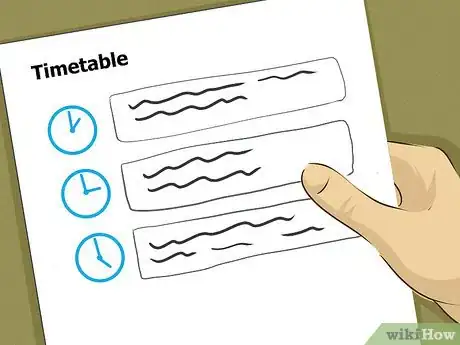
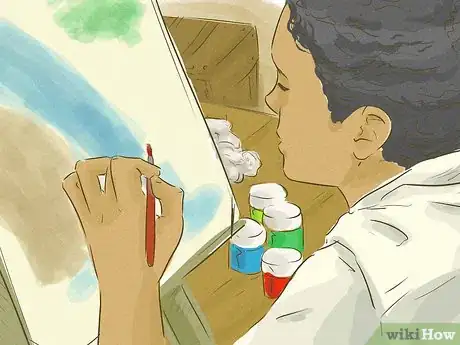




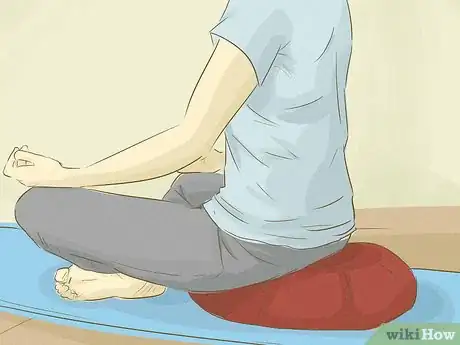


-Step-15.webp)
